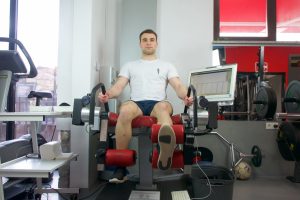
“After having an MRI of my right knee, the conclusion is a degenerative change in the meniscus with horizontal and vertical rupture of the posterior horn of the medial meniscus.
I work as a merchant and have terrible knee pain. After standing for an hour or two, I feel like my knee has stiffened.
Please give me your opinion on whether surgery is necessary or not. I am 45 years old.”
The menisci in the knee serve two roles. One is to improve knee stability by forming a deep plate that prevents slippage of the joint. In this sense, the joint socket becomes deeper, and the slipping of the head is limited.
The other role is cushioning. When the outer (lateral) meniscus is removed, studies have shown that the stress on the articular cartilage increases 2-3 times.
Surgical procedures on the meniscus are performed arthroscopically and can involve simply removing the damaged part or the entire meniscus. Alternatively, it is possible to attempt to stitch the meniscus, but this solution is suitable for very young people and specific injuries, and even then, some luck is needed for healing to occur.
In this particular case, it is clear that stitching will not be beneficial. If the menisci are indeed causing problems, then the only solution is to remove the damaged parts. The question here is whether these injuries are causing pain or if initial degenerative changes in the joint and cartilage are already at play, causing the damaged menisci to stand out the most on the MRI. To determine the answer to this question, a thorough examination needs to be conducted, and at least one attempt at physiotherapy aimed at improving local circulation and muscle strength should be made. If such a procedure sufficiently reduces the symptoms, the need for surgery ceases. Namely, except in very rare cases, surgery for meniscus cannot be delayed. This way, we avoid unpleasant situations where the condition after meniscectomy in terms of pain and other discomforts is the same as before surgery. Because it is entirely possible that the meniscus damage does not cause pain.
